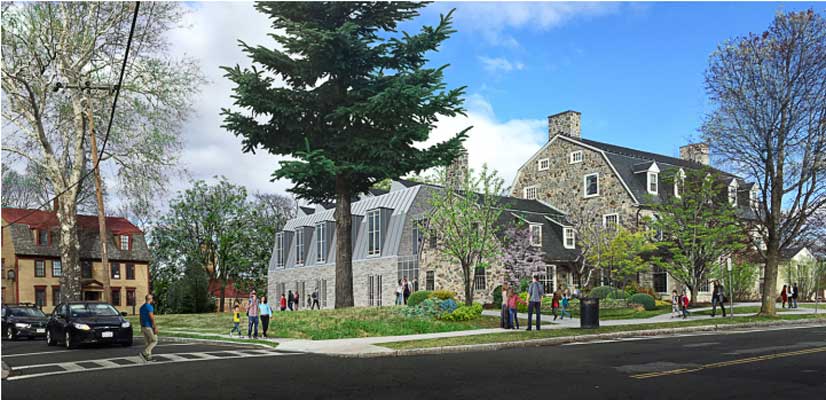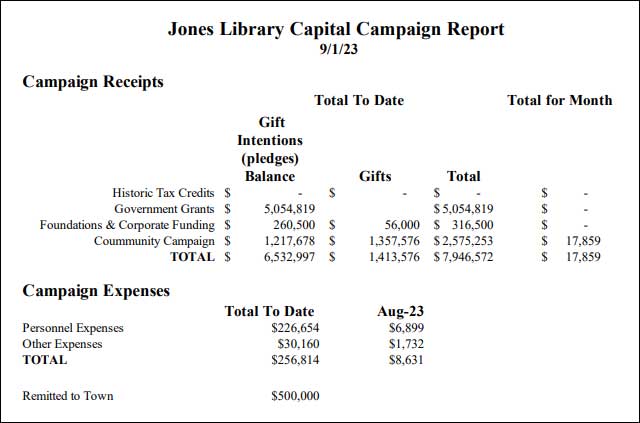Jones Library Plans Celebrity Fundraising Event While Measuring Capital Campaign Progress

Photo: https://www.joneslibrary.org/
Actor John Lithgow Talk At Amherst College Will Benefit Building Fund
At the September 12 meeting of the Jones Library Budget Committee plans were announced to host a benefit talk by actor, author and visual artist John Lithgow to support fundraising for of the Library’s proposed $46.1 million renovation-expansion. The event will take place at 7:30 p.m. on September 30, at the Johnson Chapel on the campus of Amherst College.

The award-winning veteran of stage and screen has family in Amherst. He will speak “In support of Libraries, the Humanities, and Democracy in General.”
Capital Campaign Co-chair Lee Edwards described the event as free and open to the public, with contributions to the Building Project fund encouraged. She was excited to announce that only one day after event posters went up, more than 200 attendees had pre-registered for the event. Edwards is hoping to fill the Johnson Chapel which has a seating capacity of 630. “Garrison Keillor got 340,” she pointed out.
In other promotional news, Director Sharon Sharry announced that on location shooting of a Jones Library documentary video to be introduced by actor Dennis Quaid and aired on PBS is scheduled for Thursday, September 21. The film package is created and marketed by Quaid’s production company, Viewpoint.
See related Despite Fundraising Gains, Trustees Accept Uncertainty Of Library Expansion
Trustees Take ‘Cup Half Full’ Approach Toward Announcing Fundraising Progress
The Budget Committee released the latest Capital Campaign progress report. To date, pledges, gifts and grants total $7.9 million toward a fundraising commitment by the Library of $16.5 million. This amount is necessary to cap the town appropriation of taxpayer funds toward the building project at $15.8 million plus $9 million in borrowing costs. The project budget currently stands at $46.1 million with an updated cost estimate to be obtained in October.

Conventional arithmetic would suggest that the Capital Campaign is nearing the 50% mark of its overall fundraising goal. However, Library leaders prefer to publicize that they have reached “113% of the goal of $7 million by the time of construction bid opening.”
It is uncertain where the assumption that the Capital Campaign only needs to raise $7 million by the time construction bids are received (early 2024) came from. This benchmark appears in neither the original 2021 Memorandum of Agreement between the Jones Library and the Town of Amherst nor in the 2022 amended agreement drawn up after the project cost estimate had exceeded the original appropriation by $10 million.
The amended agreement stipulates that, should the Town Council approve a necessary larger appropriation enabling the Library project to move forward, the Library is responsible for the entire balance beyond the Town’s $15.8 million appropriation and the Massachusetts Board of Library Commissioners construction grant of $13.8 million. To meet its share of the balance, the Library must draw from its endowment or tap unspecified “other sources of funds.”
Given the current project budget of $46.1 million and funds raised amounting to $7,946,572, the Library would owe the Town $8.5 million. The total value of the endowment, from which the Library draws 4% each year to cover operational costs, was reported to be $8.6 million in August.
The dire potential consequences to the Library and to the town’s liability are obvious. Prudence would seem to dictate that a significantly more aggressive fundraising goal than $7 million by construction bid time is needed to avoid undue risk to Library and Town finances.
The September Capital Campaign accounting also shows that fundraising expenses, which the Campaign is allowed to deduct from what it passes on to the town, have passed a quarter of a million dollars.

Of the total “raised” thus far, the majority of funds have come from government grants (64%). One can likely safely presume that those grants will come through at the appropriate time. Of the remaining 36% of funds, which come from foundations, corporate funding, and individual donors (the “Community Campaign”), it appears that slightly less than half of those funds (49%) are actually in hand, with the remaining 51% having been pledged. Optimism and enthusiasm no doubt will insist that all of the pledged amount will come into the library’s coffers, but how realistic is it to think that way? And given the timeline of the Jones’ fundraising (which itself is somewhat unclear), how realistic is it to assume that after this initial phase, the remaining funds will be readily handed over by eager donors, or that other untapped sources of government largesse are still somewhere out there, just waiting to be found? A PBS ad introduced by a Hollywood star may sound like a good idea, but I question why someone who lives in Northampton or Greenfield or Springfield will be motivated to give a significant amount to another community’s library. It seems that the scales have tipped dangerously under the weight of enthusiastic but ultimately unrealistic optimism.
Professional actors are on strike and need all the work they can get….
Perhaps this animated actor who’s not on strike
https://www.youtube.com/watch?v=68eue5cpbsE
sums up the financial situation more accurately?
I fully understand the skepticism, because, for so many years, it has ruled here in Amherst. My wife and I have pledged to this project, because we believe that it’s going to make Amherst a better place to live, for more people. It’s as simple as that. A generation of Amherst residents built this library in the last century. It has served the Town well. A new generation needs to make it better. It will serve as a desperately needed community center for the Town. Generations are often called upon to step up. Here we are. And then we have to move on and get the DPW and a new fire station done. There’s no need now to review why it is that we have so many public buildings in disrepair, but that’s the situation we face. We have a property tax system imposed on us by state law that makes sound fiscal capital planning extremely difficult. That, at least, is not our fault. Yes, the financial burden for the Jones falls disproportionately on the current residents of the Town, but that has happened before. Unlike other public buildings proposed in town, the new Jones has a rare element of progressivity built into its funding, because some of us who find ourselves more fortunate than others have kicked in more of our treasure in the specifically private segment of the campaign. This progressive element of the project is rarely talked about, but it’s consistent with the term “social justice”: to those to whom much is given, much is expected. We, and I mean all of us who live here, might even be looked upon in retrospect by future residents with gratitude for our vision and our perseverance in getting this done, and insisting on a more sustainable building. But we won’t be around for that.
Wow! Thank you for your service Mr. Morse.
Well said Richard. I do believe deeply that the benefits of this project far outweigh the costs.
I was just at the West Springfield Public Library – another project like the Jones that I was fortunate to work on professionally – and I was so pleased to see dozens of people using the library in so many different ways. Such an improvement.
Thank you for stepping up!
But why does the “barn” facing the Strong House and Amity street have to be so incongruent with the historical architecture? The new Gables East housing for the un-housed puts this architecture to shame! Gables East is truly a Victorian estate!
I applaud your generosity to the Jones Library, Richard. For nearly a hundred years the support of donors like you and your wife built a beloved library that made very little demand on the town treasury. It was not until 2014 that a handful of library leaders, with coaxing from the MBLC, came up with a renovation-expansion wish list and received a $13.8 million state construction grant. The only catch was that the Town would have to kick in $15.8 million of its own — at the time the largest capital appropriation in the history of Amherst.
I argue that Amherst has too many higher priority spending needs, and too burdensome a property tax rate to justify expanding a historic library that is already one of the 25 largest in the state. The urgency of our need for a community center is debatable, and whether one should be located in the library is even more debatable.
Reserving funds needed for the proposed library project had the effect of magnifying the size of the debt exclusion that Amherst citizens had to pass last spring to pay for the new Fort River School. We can expect the hefty tax increase to drive more low and middle income residents out of town. I consider that the opposite of social justice.
If the taxpayers are going to be asked to foot much of the bill for Jones Library improvements, the public should have a seat at the table in deciding the scope, programming needs and cost of the project. Town leaders have driven the costly library building project forward despite the fact that the public has never been offered that dialogue.